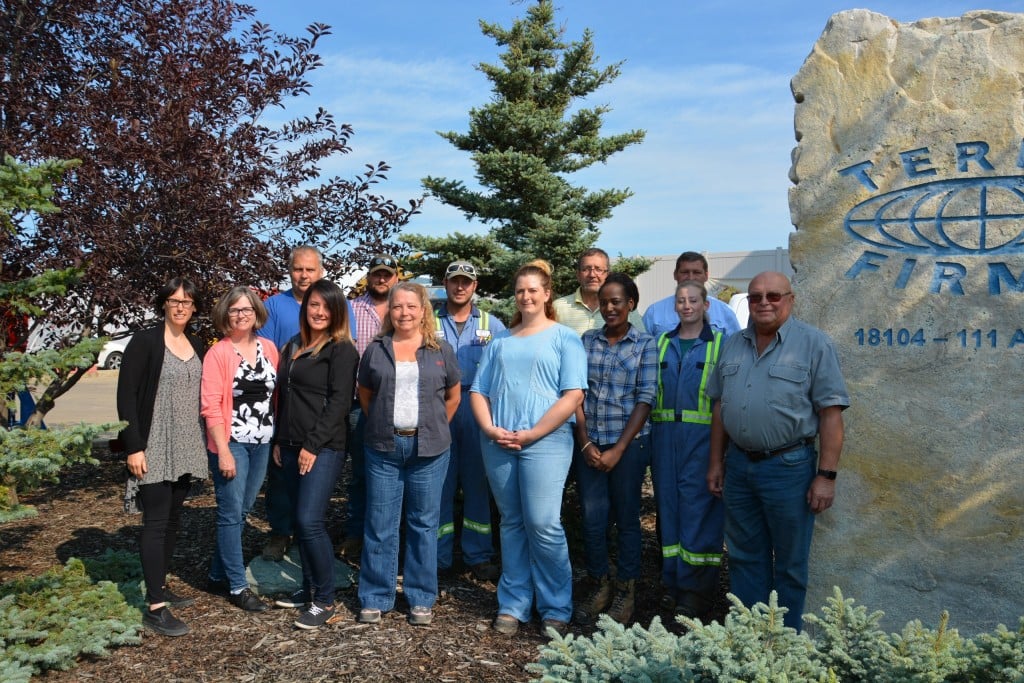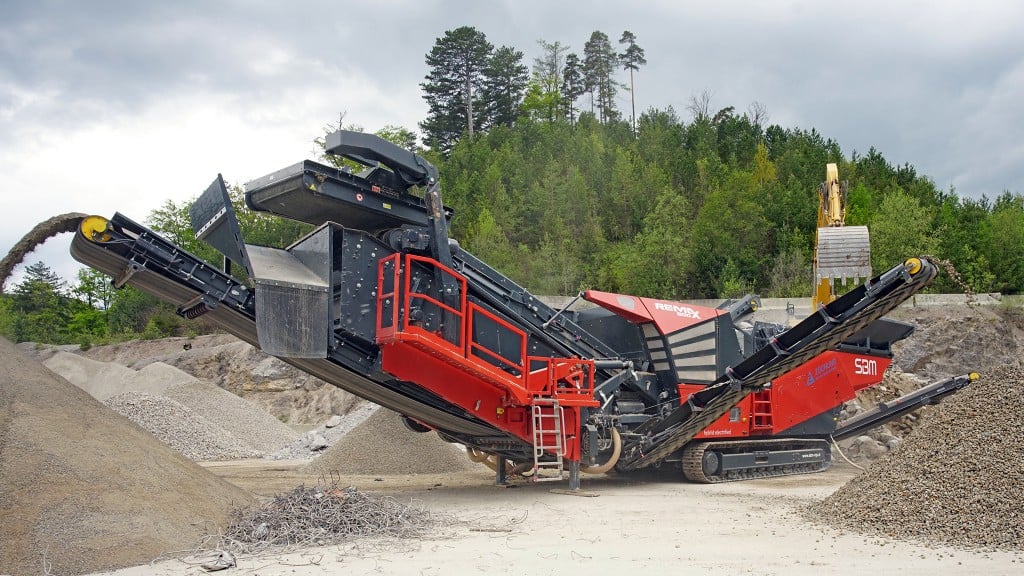Terrafirma celebrates 50 years in the heavy equipment business
A half-century supplying the demolition and construction industries makes for a company that knows their equipment and their customers

Terrafirma Equipment Sales & Rentals was started by Erich Janke and Sid Mason in 1967, originally incorporated as Terrafirma Enterprises. Janke, born in Saskatchewan, eventually found himself in Calgary working as a heavy-duty field mechanic for Case and other equipment manufacturers. This is where he met Mason, a shop manager.
"We thought we should start a business together," explains Janke. "The first wheel loader we bought was a Case W24, an insurance job from a forestry company in Golden, B.C. We rebuilt it, rented it and then sold it. We bought some more wheel loaders, fixed them up, sold them, bought some more equipment and started renting it. Things just started to grow from there."
In 2017, Terrafirma is celebrating its 50th year in business. The company carries equipment from over a dozen major equipment manufacturers in their rental fleet, including Case, Cat and Link-Belt, and is a dealer for Rotar North America, RK Magnetics, Atlas Copco and Allied Construction Products for hydraulic attachments. They are also a dealer for SBM MFL crushing plants, concrete mixing plants and concrete recycling plants, as well as Lintec asphalt mixing plants. From their headquarters in Edmonton, Terrafirma specializes in the supply and service of heavy equipment to the construction, C&D, recycling, mining, quarry and other industries.
Janke says he saw a great deal of change in 50 years. For example, today Terrafirma buys new equipment, rents it and sells it. In the beginning, the equipment they bought for rental and sale was used and then rebuilt.
"Manufacturers now understand how lucrative the rental business can be, and they are ‘keyed' into supplying companies like ourselves with new equipment for rental," Janke says.
He adds that their success over 50 years is rooted in many things. One philosophy that has been central to a profitable and rewarding half-century in the heavy-duty equipment rental and sales business, he puts simply: "We always like to pick the best." Terrafirma decided about 30 years ago to focus on carrying only the "latest and greatest" equipment and technology - whether it be attachments, excavators, crushing plants or other equipment.
"The way I look at it is, you have two different types of contractors. You've got the ones that are looking for a 10-yearold machine, and want the best price. The other kind is the contractor that wants the leading edge of technology. They know where to come for equipment, and we don't have to sell them on anything. With our equipment, you don't need to take it for a test drive. You don't need to demo it. The movers and the shakers out there, the engineers, the top contractors, they have everything researched when they come to us.
"These guys want to do their job for the least cost-per-ton. They know the hard numbers. And the bidding today is getting more competitive, more scientific. Every move has to count."
The changing face of demolition and recycling
He says the C&D industry, specifically the demolition side of it, is one he has seen change very quickly, and is following, in many ways, what the Europeans are doing.
"One customer of ours explained it, a demolition guy out of the U.S. He said ‘How we're recycling concrete in North America today is what they were doing in Europe 20 years ago.'
"It used to be, in some cases, that if you couldn't build, you became a demolition contractor. Today, because of the regulations, the recycling industry, for the up-and-coming demolition contractors, it's become an art. Recycling really means recycling."
"The guy that is up with the latest and the greatest, he can do a demolition job, do the separation, recycle for a price that the ‘crasher and basher' can't compete with." ["Crasher and basher" is an industry term Janke uses for contractors that may not use the latest methods, equipment and technology available.]
Janke adds that the way buildings are built has changed as well.
"Buildings that were built in the '60s were tough. They were built to last. They used to use four feet of concrete for foundations. Today, with newer concrete, they can make one foot perform just as well. So there's less volume. But the technology to break up that one-foot concrete has to be a lot better. And all concrete has to be crushed now, because you can't just dump it into any landfill.
"Today what we're seeing, for most warehouses and other commercial buildings, the building envelope is only good for 30 to 35 years. That's how they build them now. So today we're looking at buildings that were built in the '90s that need to start coming down. And, they're just making new spaces, for expansion. And this is why our landfills are filling up, and regulations are getting stricter as to what you can bring in. Dumping fees are getting higher. You can't bring in contaminated material. Thirty years ago, you could haul everything to a landfill. But that's all stopping. Concrete has got to be recycled."
Janke points to Edmonton as an example; any concrete that comes off city streets or building sites is recycled by the City.
"There's a lot more regulation today. Contractors have had to become more efficient. You can't be a ‘crasher-basher' anymore. You have to use the right type of equipment for doing your demolition. And everything needs to be recycled, or we're going to run out of room.
"All industry is upgrading, becoming more environmentally friendly. It has to."
A good example, he says, is with concrete batch plants. "Around the country, there are huge piles of rejected and overage concrete material just sitting there." He says SBM has designed a reclamation plant that processes this material and feeds it back into concrete production. "This is not only great for the environment, it also saves the batch plant money."
Technology, safety and the environment
Of course, over 50 years, Janke has seen many significant changes in the technology behind the machines they carry, as well as advances in safety features on all equipment and much improved environmental friendliness of engines and drives. He points to their line of mobile and stationary crushing plants, manufactured by SBM-MFL out of Austria - a relatively new technology specialization for Terrafirma.
"All our crushers from SBM MFL are 100 percent diesel-electric," says Janke. "Fuel-efficiency is a big thing. The industry is changing. By the end of 2017 all construction equipment must be equipped with Tier 4 diesel engines. You can't import a crushing machine that's not Tier 4."
Safety is changing as well. Janke says all excavator cabs now include FOPS and ROPS. "In the old days, you had to always build a third post ROPS around an excavator. Today, that's all built into the cabs.
"New machines have two- or three-inch seatbelts and better lighting. When it comes to egress from the machine, steps, handrails and guarding are located in the right spot. If you look at the latest excavators, they have railings around the top to prevent falls. Plus, you have side-view cameras and rear-view cameras." Janke notes also that the technology behind efficiency on the latest mobile and stationary crushing plants has advanced greatly.
"On the latest diesel-electric Tier 4 crushing plants from SBM MFL, the computer regulates how fast the feeder is going to feed the crusher, based on the load of the crushing chamber electric motor. That, in turn, electronically speeds up or slows down the discharge belts. So these crushers are working to maximum efficiency, 100 percent of the time. On a diesel-hydraulic or diesel-mechanical crushing unit, material is fed in bumps and surges. So you haven't got the efficiencies."
Another significant change in the industry that has occurred over the last decade means that Terrafirma, SBM and the contractor have the ability to monitor equipment electronically.
"They can look in to see if all the systems are operating at peak efficiency. If there is a problem, the factory in Austria can troubleshoot directly, and they can help with what we have to do in order to get the machine going again."
Good quality, good luck and good people
One thing that manufacturers respect about Terrafirma, according to Janke, is that they are a company that is not looking primarily at price, but more so at quality.
"If you buy something that's good, the customers who know what's good are going to come to you. This is why we don't need salespeople," says Janke. "The secret is, if you've got a good product, it sells itself. The customers are not going to ask what the price is. Discriminating buyers buy for quality, not price."
He adds that there are two other elements that come into the picture.
"Good luck and good people," he says. "In successful business, there's good luck involved. And I think we've had lots of good luck. We have also been fortunate to have really good people work for us - people who do their job well, take pride in what they do and make our customers feel valued."
He says it's also important for Terrafirma to service what they sell.
"Our equipment availability is kept at a maximum because of the parts we keep in inventory, and our attitude towards parts turnover: less focus on inventory turns, and more on stocking what may be needed by our customers.
"Our customers think about efficiency of the equipment they buy, availability and safety. That's what makes them successful. And I think that reflects why we are successful." RPN
This article was originally published in the September 2017 edition of Recycling Product News, Volume 25, Number 6.


